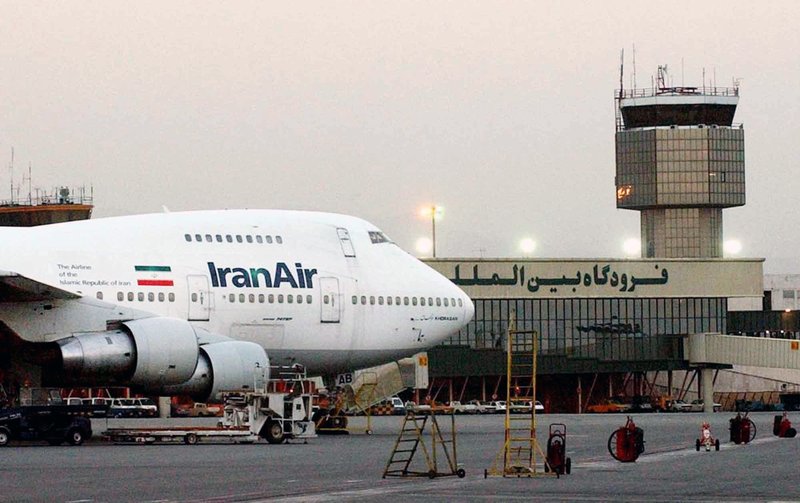DUBAI, United Arab Emirates -- Boeing Co. said Tuesday that it signed an agreement with Iran Air "expressing the airline's intent" to buy its aircraft, setting up the biggest business deal between the Islamic Republic and the United States since the 1979 U.S. Embassy takeover in Tehran.
Already, one Iranian official has said the deal could involve 100 aircraft while another has suggested Iranian airlines may purchase airplanes worth $25 billion from Chicago-based Boeing, welcome news to workers on its assembly plants around Seattle.
However, the long-standing enmity between the U.S. and Iran, as well as other sanctions, still could complicate any agreement -- even after last year's nuclear deal. And even if the $25 billion deal is finalized, aircraft deals often are announced at list prices, meaning the actual price tag would likely be lower as airlines typically get steep discounts.
Boeing issued a statement to The Associated Press saying that it signed the Iran Air agreement "under authorizations from the U.S. government following a determination that Iran had met its obligations under the nuclear accord reached last summer."
"Boeing will continue to follow the lead of the U.S. government with regards to working with Iran's airlines, and any and all contracts with Iran's airlines will be contingent upon U.S. government approval," it said.
Boeing's statement offered no further details. Fakher Daghestani, a Dubai-based spokesman for the manufacturer, declined to elaborate.
Iran Air, the country's national carrier, said Monday that it wanted to buy new Boeing 737s and 777s. The 737s are single aisle jets, typically used for flights of up to five hours. The 777 is a larger plane that can carry passengers for 12 hours or more.
Earlier Tuesday, Iran's Transportation Minister Abbas Akhoundi said possible deals between the Islamic Republic and Boeing could be worth as much as $25 billion, on par with the country's earlier agreement with its European rival, Airbus. That deal was for 118 new planes. Iran also has ordered 20 airplanes from French-Italian aircraft manufacturer ATR.
"The initial talks were held and I can say Boeing is negotiating with the U.S. officials and possibly the amount of our purchase is equal to Airbus," Akhoundi said.
The overall size of the proposed Boeing sale to Iran, however, remains unclear. Ali Abedzadeh, the head of Iran's Civil Aviation Organization, was quoted Sunday by the state-run Iran newspaper as saying the sale would involve 100 Boeing aircraft, something the manufacturer has declined to discuss.
If the deal goes through, he said the first Boeing plane could arrive in Iran in October.
Some analysts were skeptical that Iran will ever take delivery of so many jets.
"A $25 billion deal delivered by unicorns -- flying unicorns," said Richard Aboulafia, an analyst with Teal Group Corp. "Some planes may or may not be delivered but everyone has a huge interest in inflating the likelihood of this happening. Airbus and Boeing are desperate for a growth story and the Iranians love commercial opportunities for political leverage."
Aboulafia said the market faces too much competition from Etihad, Emirates and Qatar -- the rapidly growing airlines directly across the Persian Gulf from Iran.
Iran Air, whose website lists 43 airplanes in its fleet, has direct flights to 35 international destinations, including London. The European Union eased its restrictions on Iran Air last week.
In the past 12 months, global airlines have scheduled 150,000 flights to and from Iran, with 22.7 million available seats, according to schedule tracking service Diio Mi. It is unclear how many of those seats were actually filled. For comparison, during that same period, there were 250,000 flights to and from Poland, a country with a similar GDP but roughly half the size of the population, with 34 million available seats. The world's largest aviation market, the United States, had nearly 10 million scheduled flights.
Iranian airlines have some 60 Boeing airplanes in service, but most were purchased before the 1979 Islamic Revolution that ousted Shah Mohammad Reza Pahlavi and brought Islamists to power.
Out of Iran's 250 commercial planes, 162 are flying while the rest are grounded for lack of spare parts, Akhoundi said Tuesday. Parts and servicing remained nearly impossible to get while the world sanctioned Iran over its nuclear program.
The Iranian airline with the most service was Iran Air with 4.4 million of those seats, followed by Iran Aseman Airlines with 3.1 million, ATA Airlines and Mahan Air with 2.1 million each and Qeshm Airlines with 1.8 million. The largest non-Iranian airline to serve the country was Turkish Airlines with 1.3 million seats, followed by Emirates Airline with 1.1 million seats.
Boeing has been cautious about entering Iran's market as other sanctions remain in place against Tehran. American officials had said as recently as last weekend that the sale would need clearance from the U.S. Treasury.
It's unclear what changed in the past few days. Asked to comment on Boeing's assertion that the company had signed the Iran Air agreement under authorizations from the U.S. government, a Treasury Department representative said: "We do not comment about engagement with specific private entities. This is a policy across all of our sanctions programs. It is not specific to our Iran sanctions program."
It is likely Boeing may run the sale through an overseas subsidiary and use a currency other than U.S. dollars in order to avoid running afoul of American laws.
Ben Moores, an aerospace analyst with IHS, said the deal likely would need to involve leasing aircraft as well because Iran desperately needed airplanes now. He also suggested Boeing may be willing to deeply discount some of its older model 737 aircraft -- meaning the $25 billion figure might be based on retail prices.
"No one's going to pay list price," he said. "I don't think it will be anywhere near the $25 billion -- that's a huge order."
Business on 06/22/2016
